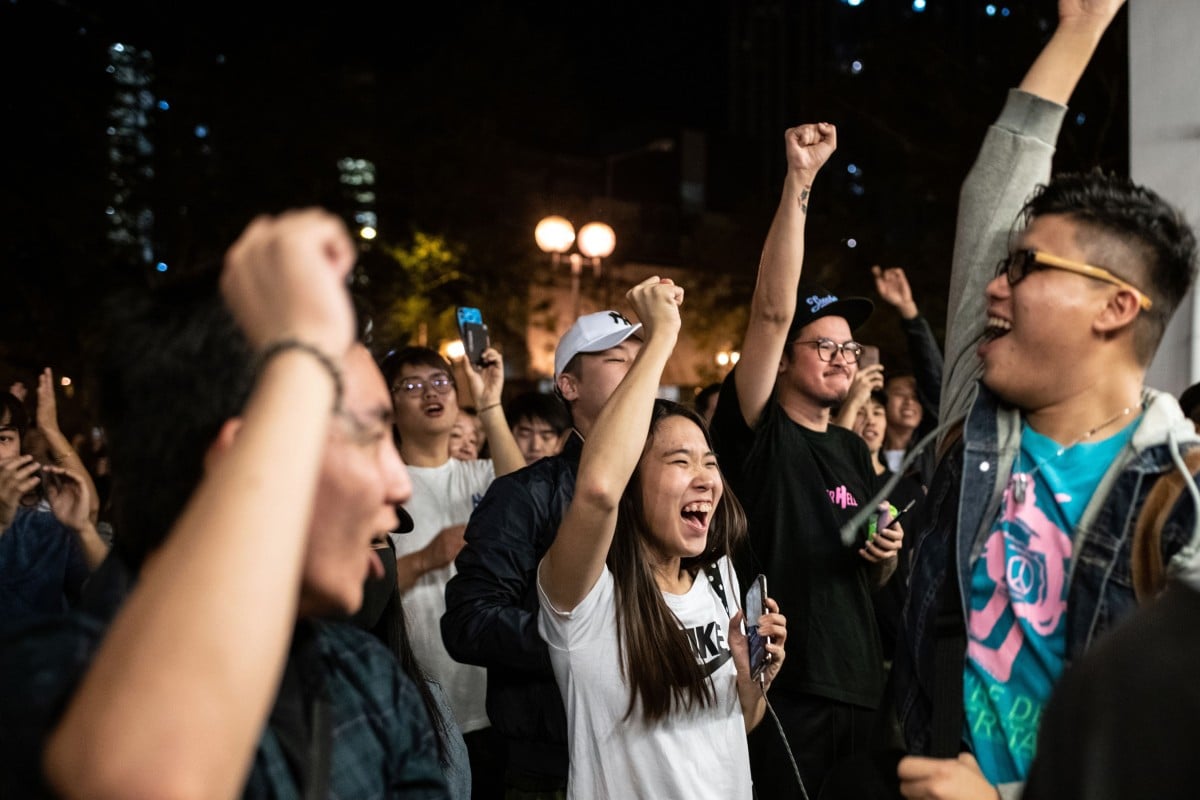
State news agency Xinhua refuses even to note pro-establishment side’s heavy losses and reports only that the elections have taken place
 Pro-democracy supporters celebrate the defeat of Junius Ho Kwan-yiu, one of the most high-profile losers in Sunday’s vote.
Pro-democracy supporters celebrate the defeat of Junius Ho Kwan-yiu, one of the most high-profile losers in Sunday’s vote. News of the landslide defeat for pro-establishment camps in Hong Kong's district council elections was heavily censored in Mainland China on Monday, as state media preferred to focus on calls for law and order to be preserved and accused Western countries of instigating unrest.
Many official media outlets only ran brief reports on the vote, with state news agency Xinhua declining to report the results, in which the pro-democracy camp took control of 17 out of 18 councils.
“According to the announcement by the Electoral Affairs Commission, all 452 district councillors of 18 districts have been elected,” it said.
The report continued: “In the past five months, violent rioters who wanted to turn Hong Kong upside down have colluded with foreign forces … non-stop social unrest has seriously disrupted the election process, and some troublemakers have harassed individual patriotic candidates on the election day."
“At present, putting an end to the violence and restoring order remain the paramount tasks of Hong Kong.”
People’s Daily, the Communist Party’s mouthpiece, said in a commentary published on its Weibo account that Sunday’s elections had been held under the “shadow of black terror” and praised the Hong Kong police for doing their best to ensure a “peaceful, safe and orderly” poll.
The commentary also appealed to “patriots” in Hong Kong to remain united in spite of the setback.
Pan-democrats see stunning victory in 2019 district council elections
“People who love China and Hong Kong should focus on Hong Kong's long-term and overall benefits, and stay united to overcome the [current] difficulties and continue to shoulder the responsibility of restoring public order and safeguarding Hong Kong's prosperity,” the commentary said.
Speaking to reporters in Tokyo, Foreign Minister Wang Yi also played down the significance of the defeat and said the elections would not change the fact that Hong Kong was part of China.
“It’s not the final result yet. Let’s wait for the final result, OK?” Wang said on Monday morning before all the results had come in. “However, it is clear that no matter what happens, Hong Kong is a part of China and a Special Administrative Region of China.”
What are the five demands? A reminder of what the protesters want
He also alluded to the charge that Western countries, especially the US, have been encouraging the anti-government protests, saying: “Any attempt to mess up Hong Kong, or even damage its prosperity and stability, will not succeed.”
Xinhua also published a commentary attacking US politicians for pushing the Hong Kong Human Rights and Democracy Act – which recently passed both houses of Congress.
The commentary warned that some American politicians were “playing with fire” and said their ploy was doomed to fail.
Two mainland academics specialising in US affairs argued that the election results would only serve to escalate tensions between Washington and Beijing over Hong Kong.
Zhu Feng, a professor of international relations at Nanjing University, said the congressional vote was a timely way for lawmakers in Washington to show support for the anti-government protesters.
“They will see it as another big victory for US human rights diplomacy,” Zhu said, referring to the increased profile given in Washington to issues such as Hong Kong and Xinjiang, where the Chinese authorities are accused of detaining a million Muslims in re-education camps.
What effects can tear gas have on your health and the environment?
Zhu also argued that the results would cause further “uncertainties” in US-China relations “as Washington appears keen to use democracy and human rights to attack China”.
Huang Jing, from Beijing Language and Culture University’s Institute of International and Regional Studies, said Washington was likely to step up its support for Hong Kong’s pro-democracy activists.
“Both sides will look attentively at the Hong Kong Legislative Council election next year, as Hong Kong has apparently become a new flashpoint between the two countries,” Huang said.